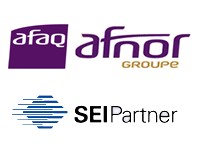ISO 50001:2011 – Energy Management System
Energy is the lifeline of every atom of this universe. Energy is the lifeline for every organization of this world. These two statements are the universal truths. It is very important to use energy efficiently and effectively. Through the supply chain of a business – from raw material to recycling – from cradle to grave – lifecycle of a product. ISO 50001, the Energy Management Standard (EnMS) is based on the continual improvement based management system model to integrate its energy management system with environment, health and safety management system.
Purpose of ISO 50001:2011
ISO 50001:2011 – Energy Management Systems (EnMS) – Requirements with Guidance for Use, is an International Standard on Energy Management. It enables organizations to establish the system and processes necessary to improve energy performance, including energy efficiency, energy-use and energy-consumption.
Benefits of ISO 50001
Key Benefits of implementing ISO 50001 based EnMS:
- reduction in energy consumption
- reduction in greenhouse gas emission and climate change
- reduction on resource depletion and impact on environment
- monitor energy use to improve efficiency
Features of ISO 50001
ISO 50001 EnMS emphasises the importance of PDCA (Plan-Do-Check- Act) and incorporates energy management in day to day activities:
- Plan: Conduct energy review and establish, energy performance indicators (EnPIs), Objectives, targets and action plans necessary to deliver results that will improve energy performance in accordance with the Organization’s energy policy (Refer Clause 4.1, 4.2, 4.3, 4.4of Standard)
- Do: Implement the energy management action plans (Refer Clause 4.5 of Standard)
- Check: Monitor and measure processes and the key characteristics of operations that determine energy performance against the energy policy and objectives, and report the results. (Refer Clause 4.6 of Standard)
- Act: Take actions to continually improve energy performance and the EnMS. (Refer Clause 4.7 of Standard)
Certification Process:
DQS Certification India appoints a competent & suitable auditor or team of auditors to audit the organization against the standard & scope requested by the clients. Gap analysis may be performed first to check readiness for the auditee organization. Certification Audit is carried out when the client is ready for assessment. Routine surveillance audits are carried out to evaluate continual improvement in the validity period. A re-certification audit is performed after every three years to maintain continuity of certification.


